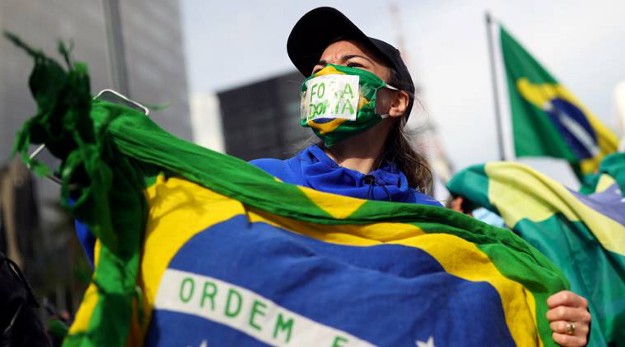
Understanding President Bolsonaro’s response to covid-19 within the greater scheme of Brazil’s economy…
You may view being Minister of Finance as this emotionless act of calculating available resources (capital) and necessary spending. It is like family budgeting but with more resources and a greater list of expenses (and a few more mouths to feed). Market makers and investors take that budget data like a grocery store clerk and stock the shelves with the goods consumers have statistically shown a higher inclination to purchase and offer a few extra services that will draw them in.
But the reality of the role (along with that of the President) is an act of psychology and confidence building. The therapist (or president as one economist described it) needs her patients to buy into a certain view of the world and adapt their behavior to that view: “Don’t have fear of failure…rather view the task as an opportunity for learning and potential success”…Or, more so, believe the world is back to normal and you should pursue business as normal. This line of thinking may be the silver lining in a bad game of prisoner’s dilemma with covid-19 in Brazil.
Bold and different in many ways…
Shortly after the first confirmed covid-19 cases in Latin America in February, equity and debt prices plummeted across the region. The Brazilian stock exchange index IBOVESPA provided the largest freefall in the month of March with equities falling 16% in one day on the 12th of March. Most analysts interpreted Brazilian President Jair Bolsonaro’s response to the virus and the market freefall as apathetic with a general ‘keep calm and carry on’ mentality. Now, having tested positive, the public (cough patients!) are awaiting to see if Bolsonaro’s demeanor and approach change (yes, he is wearing a mask but a court ordered him to do that).
It is may be too late for Bolsonaro to go from “let’s have a bbq” mantra to “let’s protect ourselves against covid-19.” He also may not feel compelled to make that change. His boldness and unorthodox approach to changing Brazil’s political system in his presidential campaign two years ago can be appreciated. His government quickly (in Brazilian terms) pushed through pension reform in October 2019 and coupled it with a more sustainable path forward with changes in public finances and the budget for the country. Led by Minister of Economy Paulo Guedes, the Bolsonaro administration sold more than $23 billion in state-owned assets in 2019, implemented deregulation measures, and eased monetary policy (including installing some of the lowest interest rates seen in recent history in the country). As Bolsonaro emphasized in 2019, the focus was on economic growth.
Covid-19 and the most vulnerable (economies)
As 2019 was the year of change, 2020 was expected to be the return to growth. Yet covid-19 is exposing the existing macroeconomic vulnerabilities of the country (that we already knew was there based on the last five years). The policy direction and efforts that underpinned a relatively successful 2019 for the “outsider” president now will not have the time and space to create the changed envisioned by the Bolsonaro administration.
Bolsonaro’s great effort to get the Brazilian public to pretend the virus is not coming for them had some economic reasoning behind it. First, lockdowns have generally bumped up unemployment in other economies, frustrated locals across the globe, and thrown economies into chaos. For any Brazilian president, choosing an option that CLEARLY increases unemployment is hard. The number of unemployed persons in the country almost doubled between 2012 and 2019 (going from roughly 7.6 million to nearly 13 million-plus during early 2019). The number declined by the end of 2019 but the employment nightmare in Brazil is hard to forget. Secondly, Brazil remains saddled with debt. The uncontrolled spending that plagued previous administrations cannot be easily wiped away with economic reforms. Policy changes altered the path for the future not the actual amount to be paid today.
Appreciating the storylines of unemployment and public debt in Brazil, the Bolsonaro administration thus seemingly worried about shutting down Latin America’s biggest economy in the midst of the current pandemic. Such lockdown actions would exacerbate the fragility of Brazil’s economic turnaround plan by creating the need for a stimulus package (similar to those seen across the globe), which would only expand the current account deficit and drive down the currency. Both are likely to happen regardless as the pandemic continues to decimate different parts of the globe and disrupt every aspect of life and business
Bolsonaro is also stuck in the reality of campaigning for validity. In other words, he still must prove his presidency is legit to the public that supported leftist administrations for some years. Although his administration reduced the country’s debt in 2019, that story partially can be added to the trend line that began in 2017 (yes, the country was trending positive on reducing its deficit since 2016!). Furthermore, the majority of Brazilian debt is in local currency thus the currency plunge is not exactly raising the cost of debt, which has been seen in other countries (i.e., Argentina, Lebanon, etc), but it is being felt by some Brazilians in their pockets. Bolsonaro’s administration sadly will have this backdrop juxtaposed with a likely bump in the deficit this year and he sadly cannot say a covid-19 lockdown caused it (though the reality of covid-19 globally surely underpins his troubles at home).
Still betting on Brazil…
If Bolsonaro continues on the same path with covid-19, he must face the reality that his refusal to impose a lockdown will consume any storyline of 2020. Two health ministers previously departed over Bolsonaro’s response to handling covid-19 and other members of the cabinet have (quietly) showed their frustration. That said, he has contained any political fallout…no one expects the Bolsonaro administration to cave anytime soon or walk off stage. Furthermore, the currency is cheap and domestic investors are starting to come back to the market. Exports are likely to perform well in the near term post-covid-19 with local costs of production and returns both done in local currency. The biggest concern for Brazil may be whether foreign capital will come back to the country. Cheap does not necessarily mean good and thus does not always entice investors…a few Latin American countries can give a history lesson on this reality.
There are many uncertainties to the Brazil model…but these uncertainties are not exactly a product of the Bolsonaro administration. The reality is that the only true certainty with covid-19 is that there will be a lot of uncertainty. Thus Bolsonaro’s ‘let’s sit still and see what happens’ approach may simply boil down to the ‘outsider’ president saying let’s try something different when he knows the other options may ultimately cripple his presidency, the economy, and his country.
